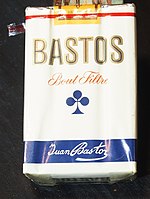This article has multiple issues. Please help improve it or discuss these issues on the talk page. (Learn how and when to remove these messages)
|
 | |
| Product type | Cigarette |
|---|---|
| Owner | Imperial Tobacco |
| Country | Kingdom of Spain |
| Introduced | 1830s |
| Markets | See Markets |
| Carcinogenicity: IARC group 1 | |
Bastos is a Spanish brand of cigarettes currently owned and manufactured by Imperial Tobacco. It used to be owned by Altadis until it was taken over by Imperial Tobacco in 2008.
History
Bastos was founded in the 1830s by the Spanish pioneer and businessman Juan Bastos (1817–1889). He was moved with his parents from his birthplace in Málaga to Oran in French Algeria the day after the French conquered the place. They were among the first Spaniards to live in Algeria at that time.

Not long after, Juan opened a tobacco shop, just as it existed back in Spain, with the intent of providing the soldiers there with snuff. His first tobacco company was called "Cigars and Cigarettes J. Bastos", which was founded in 1838 as one of the first "industrial" establishments of the new colony.
After he died on 1 September 1889, his widow Francisca and his four children transformed the Tobacco Factory Juan Bastos into a partnership. Just before the start of the First World War, the Bastos company transformed into a Public limited company and was known as one of the first industrial enterprises in Algeria.
When Emmanuel (one of Juan's sons) died in 1920, the members of the family sold their shares, which were bought immediately by the Hoskier Bank. Eventually, a second bank, the Crédit Foncier de France would acquire almost all of the shares held by the Bastos family.
After World War II and the Algerian War, in which Algeria became independent, the Bastos house moved their operations to Cameroon, Louiseville (Canada), Bastia (France), Dakar (Senegal), Switzerland, Saigon (Vietnam) and, together with Job (another one of Juan's sons), a factory was built near Ajaccio (France).
In 1986, the local Juan Bastos Tobacco Company in Cameroon was bought out by British American Tobacco after the company could not compete in the region anymore.
Sponsorship
Grand Prix Motorcycle Racing
Bastos sponsored the Cagiva factory team during the 1986 and 1987 Grand Prix motorcycle racing season.
Markets
Bastos was or still is sold in the following countries: Netherlands, West Germany, Belgium, Luxembourg, France, Switzerland, Spain, Hungary, Madagascar, Laos and Vietnam.
In popular culture
Novels
In Captain Conan, Lieutenant Norbert (the narrator of the novel) offers some Bastos cigarettes to a Dubreuil military priest in the year following the end of World War I. The priest refuses politely, saying, "These are the cigarettes for the choir children, Lieutenant." after which he fills his pipe with tobacco.
In the Italian film version of the novel "The Stranger" by Albert Camus, the hero Mersault sits on his balcony in the afternoon and observes a shopkeeper emerge from his store across the way to sit on a stool in the doorway. On the wall alongside him is prominently displayed an adverisement for Bastos cigarettes.
See also
References
- "Brand portfolio". Imperialbrandsplc.com. Archived from the original on 23 March 2020. Retrieved 27 February 2019.
- "Imperial Tobacco wins control of Altadis". The Economic Times. 23 January 2008. Retrieved 27 February 2019.
- "Juan Bastos". Memoireafriquedunord.net. Retrieved 27 February 2019.
- "Juan Bastos". Exode1962.fr. Retrieved 27 February 2019.
- Belda, Pascal (27 February 2019). Cameroon. MTH Multimedia S.L. ISBN 9788493397852. Retrieved 27 February 2019 – via Google Books.
- "1986 Cagiva GP500 Tipo C10". Coys.co.uk. 25 January 2016. Retrieved 27 February 2019.
- "Cagiva Motor S.p.A." Cagiva Motor S.p.A. Archived from the original on 23 March 2020. Retrieved 27 February 2019.
- "Bastos". Zigsam.at. Retrieved 27 February 2019.
- Vercel, Roger (2 November 2012). Capitaine Conan. Albin Michel. ISBN 9782226228017. Retrieved 27 February 2019 – via Google Books.
| Imperial Brands | |||||||
|---|---|---|---|---|---|---|---|
| Brands |
| ||||||
| Subsidiaries | |||||||
| Predecessors | |||||||
| People | |||||||
| Australia only; Brands of Habanos, a 50:50 joint venture between Imperial Tobacco and Cubatabaco; 50% share; formerly, "Commonwealth Brands"
| |||||||
| British American Tobacco | ||||||||||
|---|---|---|---|---|---|---|---|---|---|---|
| Subsidiaries |
| |||||||||
| Brands | ||||||||||
| People | ||||||||||
| Other | ||||||||||
| ||||||||||